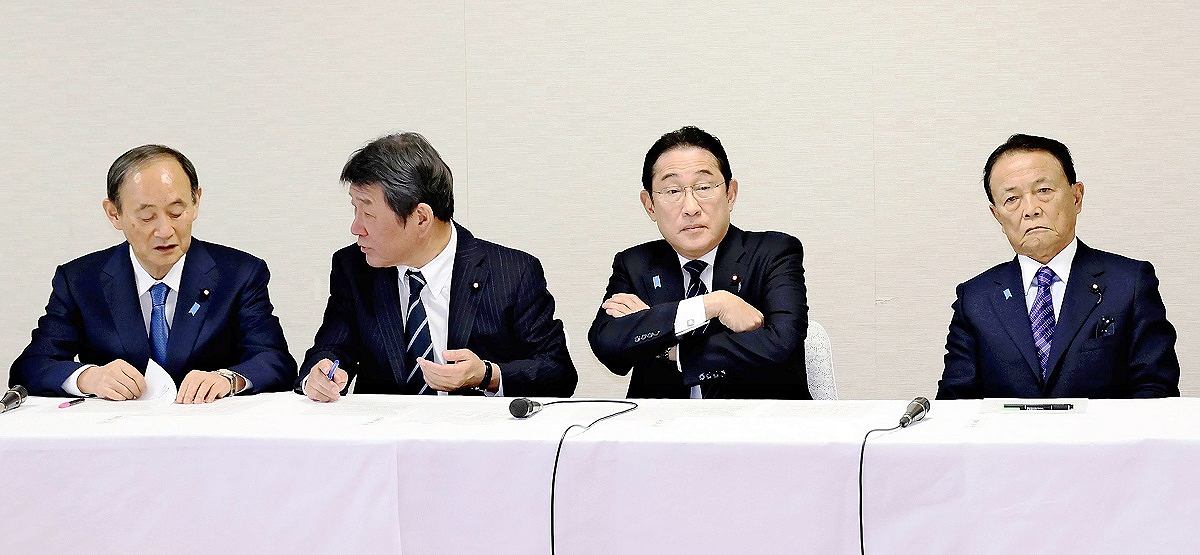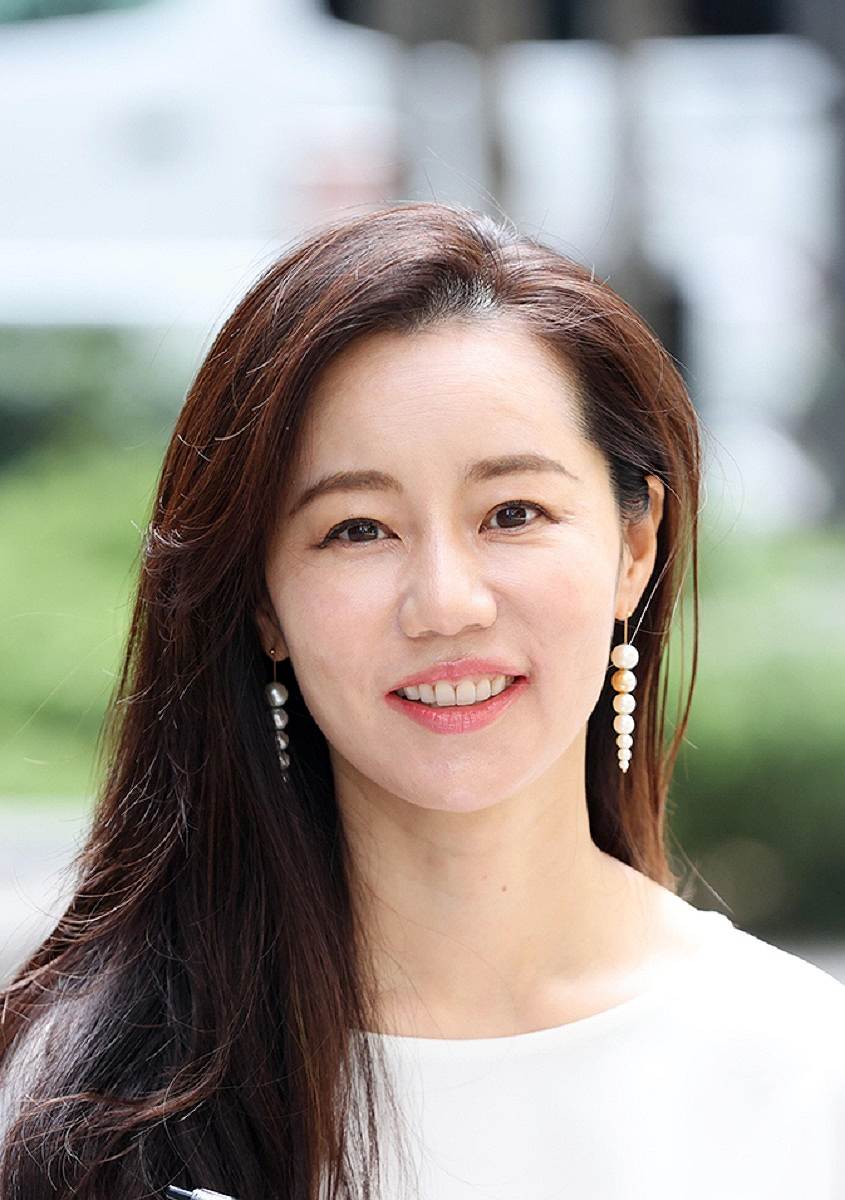
From right to left: Liberal Democratic Party Vice President Taro Aso, Prime Minister Fumio Kishida, LDP Secretary General Toshimitsu Motegi and former Prime Minister Yoshihide Suga attend a party meeting in January.
8:00 JST, June 29, 2024
Political reform was a major topic of discussion during the ordinary Diet session that closed on June 23, amid the “politics and money” scandal involving the ruling Liberal Democratic Party. Prime Minister Fumio Kishida, whose Cabinet approval rate has been steadily declining, tried to regain the public’s trust by passing the revised Political Funds Control Law while accommodating many of the demands from other parties. However, Kishida may have given up something crucial in exchange for getting the bill passed.
Kishida appears to have lost the support of LDP Vice President Taro Aso, a powerful political figure who has supported the prime minister since the beginning of his administration and served as his de facto parent. Aso has not always shared the same political views as Kishida — for example, he opposed Kishida’s decision to dissolve LDP factions and maintained his own faction. Nevertheless, Aso patiently tried to support Kishida as much as he could.
Because of his own experience as a prime minister from 2008 to 2009, a time when he dealt with strong public disapproval, Aso knows how difficult it is to stay in that position. He once described the pressure on prime ministers as “dusky black loneliness.” However, Aso’s patience seems to have run out with Kishida, who overrode his opposition and enacted a bill that met the demands of other parties. Aso seems highly dissatisfied, and in early June, he once declined Kishida’s invitation to dinner.
As Aso becomes more distant from Kishida, LDP lawmakers are beginning to publicly demand the prime minister’s resignation. Joining Aso in this push is another political powerhouse: former Prime Minister Yoshihide Suga. On June 23, Suga publicly stated that a new leader should be chosen to replace Kishida in the LDP presidential election scheduled for September. Unlike Aso, Suga has kept his distance from the current administration since Kishida took office. Suga was also an unpopular prime minister during his term from 2020 to 2021, and when he tried to run for LDP president in September 2021, Kishida announced that he would run against him. Suga consequently lost his path to reelection and had to give up. Under the parliamentary cabinet system, the ruling party’s leader is generally chosen as prime minster.
Three years later, Kishida finds himself in a similar situation to Suga. We don’t know if Kishida believes in karma, but Suga is now in more active contact with post-Kishida candidates.
According to several surveys, including those conducted by The Yomiuri Shimbun, Shigeru Ishiba is the most popular LDP politician among the public. A policy wonk who has served as defense minister and secretary general, Ishiba is known for being popular outside the party but unpopular among his colleagues. As evidenced by Shinzo Abe’s victory in the September 2012 presidential election over Ishiba, who was also the most popular choice among the public at that time, the LDP has its own logic when it chooses its leader. Voters in the LDP presidential election are exclusively party members, mainly Diet members, and they prioritize matters such as friendship, loyalty and obligation. Ishiba once left the LDP when the party faced harsh public criticism but later returned. When Aso was prime minister, Ishiba demanded Aso’s resignation, even though he was a Cabinet member. During the Abe administration, he criticized the prime minister in the media as vocally as the opposition did. It’s hard to imagine that these past behaviors have been completely forgotten by LDP members.
Shinjiro Koizumi, whose father is former Prime Minister Junichiro Koizumi, is the second most popular candidate with the public. He has served as environment minister but has yet to hold a senior party position. His lack of experience will be a concern if he is to become prime minister. Taro Kono is another prominent candidate — having served as foreign minister and defense minister, he is well-known internationally. However, domestically, Kono is known as a strong advocate of political reform, which is unusual for an LDP lawmaker, and he is considered rather a political maverick. Suga supported Kono against Kishida during the 2021 LDP presidential election that included Koizumi and Ishiba. Kono is currently a Cabinet minister and belongs to Aso’s faction. Suga is reportedly unhappy that Kono has not left Aso’s faction, and Kono could not obtain Aso’s support in past presidential elections.
Sanae Takaichi, the economic security minister, looks ambitious as well. She ran for president in 2021 with Abe’s support, although now it is unclear how much backing she will receive without Abe. Yoko Kamikawa, who is the foreign minister and originally belonged to Kishida’s faction, has also been rumored as a potential candidate, but she will likely be too deferential to run as long as Kishida is seeking reelection.
LDP Secretary General Toshimitsu Motegi has made no secret of his goal to become prime minister. He regularly meets with Aso and Suga and is the former leader of a faction that was forced to dissolve by Kishida. Katsunobu Kato, who served as chief cabinet secretary in Suga’s Cabinet, is another qualified candidate. However, the biggest weakness that Motegi and Kato share is their very low popularity among the public. An important task for the next LDP president is to dissolve the lower house of the Diet as a prime minister and win the subsequent general election to keep the LDP in power, so Motegi and Kato’s low popularity with the public would be a major obstacle. There are also moves to present a new face in the presidential election, to demonstrate the renewal of the party.
Looking at the names of potential candidates, there doesn’t seem to be anyone who is unanimously agreed upon by the public and party members as the “post-Kishida candidate.” It is also not clear who Aso and Suga intend to support.
Of course, this is not to say there is no possibility that Kishida will miraculously gain support again and be reelected president. The prime minister is known for his ability to withstand adversity. Cabinet reshuffles, in which popular personalities are appointed to cabinet positions, are commonly used by administrations to regain popularity. However, Kishida, whose approval rating fell to a record low of 23% in the latest Yomiuri Shimbun poll in June, is unlikely to have the power to reshuffle his Cabinet.
If the LDP fails to win back public support through the presidential election, a shift in power to an opposition party will come closer to reality. However, the LDP is a tough political party that once elevated a member of the Japan Socialist Party to prime minister. They will do everything in their power to avoid becoming an opposition party again.
Aso, who was prime minister when the LDP lost power in 2009, and Suga, who supported him as a senior member of the LDP election committee, are probably especially determined in that regard. Suga recently stated, “We must never hand over power to the opposition.” All eyes will be on who these two men, who hold the key to the LDP’s future, will choose in the presidential election in September. Even though the Diet is out of session, a busy and politically heated summer lies ahead within the LDP.
Political Pulse appears every Saturday.

Yuko Mukai
Yuko Mukai is a Washington correspondent of The Yomiuri Shimbun.
Top Articles in Editorial & Columns
-

Riku-Ryu Pair Wins Gold Medal: Their Strong Bond Leads to Major Comeback Victory
-

China Provoked Takaichi into Risky Move of Dissolving House of Representatives, But It’s a Gamble She Just Might Win
-

University of Tokyo Professor Arrested: Serious Lack of Ethical Sense, Failure of Institutional Governance
-

Policy Measures on Foreign Nationals: How Should Stricter Regulations and Coexistence Be Balanced?
-

Japan’s Plan for Investment in U.S.: Aim for Mutual Development by Ensuring Profitability
JN ACCESS RANKING
-

Japan PM Takaichi’s Cabinet Resigns en Masse
-

Japan Institute to Use Domestic Commercial Optical Lattice Clock to Set Japan Standard Time
-

Israeli Ambassador to Japan Speaks about Japan’s Role in the Reconstruction of Gaza
-

Man Infected with Measles Reportedly Dined at Restaurant in Tokyo Station
-

Videos Plagiarized, Reposted with False Subtitles Claiming ‘Ryukyu Belongs to China’; Anti-China False Information Also Posted in Japan























